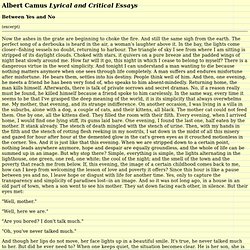

George Orwell's Politics and the English Language Guide to Writing. (2) Above all, we cannot play ducks and drakes with a native battery of idioms which prescribes such egregious collocations of vocables as the Basic put up with for tolerate or put at a loss for bewilder.

—Professor Lancelot Hogben (Interglossa). (3) On the one side we have the free personality: by definition it is not neurotic, for it has neither conflict nor dream. Its desires, such as they are, are transparent, for they are just what institutional approval keeps in the forefront of consciousness; another institutional pattern would alter their number and intensity; there is little in them that is natural, irreducible, or culturally dangerous.
But on the other side, the social bond itself is nothing but the mutual reflection of these self-secure integrities. Recall the definition of love. —Essay on psychology in Politics (New York). —Communist pamphlet Each of these passages has faults of its own, but quite apart from avoidable ugliness, two qualities are common to all of them. Is not available. Albert Camus. "Il n'y a pas amour de vivre sans désespoir de vivre.

" - "There is no love of life without despair of life. " (L'Envers et L'Endroit, 1937) "At the heart of all beauty lies something inhuman, and these hills, the softness of the sky, the outline of these trees at this very minute lose the illusory meaning with which we had clothed them, henceforth more remote than a lost paradise. The primitive hostility of the world rises up to face us across millennia.
" (The Myth of Sisyphus, 1942) "The absurd is essentially a divorce. "There is a difference between deciding that life is meaningless and deciding that it is not worth living; indeed, Camus's whole work is a clarification of that difference. " "If this myth is tragic, that is because its hero is conscious. "I have simply understood that there is only one way to make oneself equal to the gods: you must be as cruel as they are. " - Caligula (Caligula, 1944) "All our troubles spring from our failure to use plain, clean-cut language. Albert Camus. Now the ashes in the grate are beginning to choke the fire.

And still the same sigh from the earth. The perfect song of a derbouka is heard in the air, a woman's laughter above it. In the bay, the lights come closer--fishing vessels no doubt, returning to harbour. The triangle of sky I see from where I am sitting is stripped of its daylight clouds. Choked with stars, it quivers on a pure breeze and the padded wings of night beat slowly around me.
"Well, mother. " "Well, here we are. " "Are you bored? "Oh, you've never talked much. " And though her lips do not move, her face lights up in a beautiful smile. ...She has risen to turn on the light. It was true. "But I haven't left yet. "Oh, it was just to say something. " "Is it true I look like my father?
" "The spitting image. He mentioned his father without conviction. "When you think about it," she says, "it was better that way. "That's right. " "Will you be back again? " But where am I now? It is a much quoted maxim that there are only seven stories in fiction and that all others are based on them. Is it true, and what might these seven stories be?